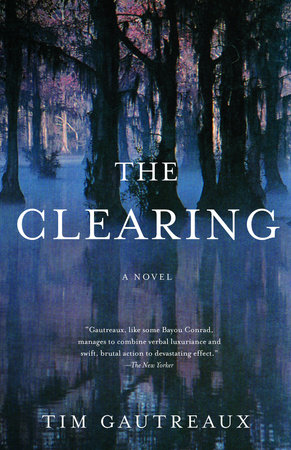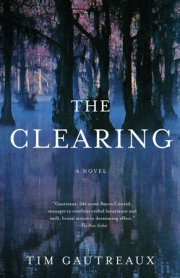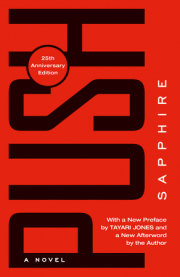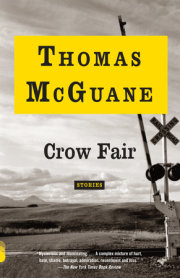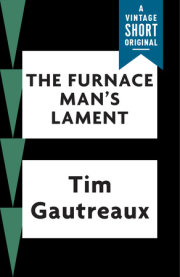Chapter One
1923
At a flag stop in Louisiana, a big, yellow-haired man named Jules stepped off a day coach at a settlement of twelve houses and a shoebox station. He was the only passenger to get off, and as soon as his right foot touched the cinder apron of the depot, the conductor pulled the step stool from under his left heel, the air brakes gasped, and the train moved in a clanking jerk of couplers.
Remembering his instructions, he walked south down a weedy spur track and found a geared steam locomotive coupled to a crew car and five empty flats. The engineer leaned out from his cab window. “You the evaluatin man?”
Jules put down his bag, glanced up at the engineer and then around him at the big timber rising from oil-dark water. “Well, ain’t you informed. I guess you got a newspaper back in these weeds or maybe a sawmill radio station?”
The engineer looked as though all unnecessary meat had been cooked off of him by the heat of his engine. “The news goes from porch to porch, anyhow.” He spat on the end of a crosstie. “I know somebody better buy this place who knows what he’s doin’.” He nodded to the rear of his train. “Load yourself on the crew car.”
The locomotive steamed backwards into a never-cut woods, the homemade coach rocking drunkenly over rails that in places sprang down under mud. After a few miles, the train backed out of the cypresses into the smoky light of a mill yard, and Jules stepped off the car as it drifted on like a wooden cloud making its own sleepy thunder. Surveying the factory, he saw it was larger than the Texas operation he’d just helped to close down, which was already rusting toward oblivion, marooned in the middle of eight thousand acres of drooling pine stumps. The new mill before him was a series of many iron-roofed, gray-plank structures connected with the logic of vegetation: a towering saw shed sprouted a planing section, and suckering off of it was the boiler house and many low-peaked shelters for the finished lumber. He stood in an evil-smelling mocha puddle, looking in vain for dry ground, then bent to tuck his pants inside his boots. As he straightened up, a man in a white shirt and vest came out of the back door of a weatherboard house and began walking toward him. When he was two hundred feet away, Jules could tell by his star that it was only the constable come to see what outlander had happened onto the property. Beyond him, the sawmill gnawed its trees, and jets of steam plumed high over the cinder-pocked rooftops, skidding off to the west, their sooty shadows dragging across the clearing. A safety valve opened with a roar above the boiler house, a man hollered down at the log pond, and a team of eight fly-haunted mules, their coats running with foam, dragged a mud sled overloaded with slabs bound for the fuel pile. Jules looked at his watch. It was a half hour until lunch time, and everybody on shift was working up to the whistle.
The constable, a solemn-looking man, big in the shoulders, walked up slowly. “Do you have business here?” He pushed back a one-dent Carlsbad hat and stared, deadpan, like an idiot or a man so distracted he’d forgotten to control the look in his eyes.
“I got an appointment with the manager to go over some figures.” Jules reached out and took the constable’s hand but dropped it as soon as he could without giving offense, thinking that if a corpse could shake hands, it would feel like this.
“Some figures,” the man said, as if the phrase held a private meaning. From behind him came a strangled shout and the report of a small pistol, sharp as a clap, but he didn’t turn around.
Jules stepped up onto a crosstie. “I helped ramrod the Brady mill in east Texas until we cut out last month. The owner, well, he lives up North and sent word for me to come over into Louisiana to look for a new tract. Maybe two, if they’re small.” In the distance three men fell fighting out the doorway of what Jules guessed was the company saloon. “This is my eighth mill in as many days.”
“I was from up North,” the constable said, turning to give a brief look at the commotion and then swinging back.
Jules noted how he stood, hands in pockets and thumbs flicking like a horse’s ears. “The hell you say. What you doing down among the alligators?”
On the porch of the saloon, two men were tying the other’s hands behind his back, one making the knot, the other kneeling on his shoulders.
“The mill manager’s office is through that red door over there in the main building,” the constable said.
“Say, why don’t—”
“Excuse me.” He began walking toward the fight, taking his time going around a broad mud hole, and Jules followed for over a hundred yards, stopping in a plinth of shade cast by the commissary. At the saloon, two men, wearing dark wool caps and suits that fit like a hound’s skin, hauled the squalling man off the high porch and over toward the millpond, and the constable caught up with them as they mounted the levee. Jules barely heard him say, “Stop.”
One of the men, barrel-shaped, his bare chest visible under his suit coat, motioned toward the water. “We gonna give the sonamabitch a swimming lesson,” he called. “He owe the house fifty dollar he don’t got.”
The bound man, a big sawyer in overalls, bent his knees and sat on the ground. “Mr. Byron, these Eyetalians is tryin’ to drown my ass.”
“Aw, naw,” the fat man said. “We just gonna watch him blow bubbles, then we gonna fish him out. That right, Angelo?”
His partner was slim, with a face full of splayed teeth; his response was to tighten his grip on the sawyer’s denim collar.
“Cut him loose.”
“I don’t think so,” the fat one told him, and in a single motion the constable reached under his vest, pulled out a big Colt pistol, and swung it like a hatchet down onto the man’s head, putting his shoulder and back into it. Jules stepped closer to the commissary wall, even at this distance seeing the brassy jet pulsing through the dark pants as the man fell sideways and rolled like an oil drum down the levee. The skinny fellow stepped away from the sawyer, showing his empty palms.
Above Jules, on the commissary porch, a clerk began sweeping boot clods to the ground. He glanced over toward the pond. “Well,” he said, as though he’d spotted a small, unexpected rain cloud.
“A little trouble.”
The broom did not break its rhythm. “He ought to know better than to hammer them dagos,” he said, turning and working the front edge of the gallery.
Jules put a hand to his chin and watched the sawyer stand up and offer his bindings to the constable’s knife. He was thinking of letters he’d exchanged over the years with a man he’d never seen, the absentee owner of his now defunct Texas mill. “What’s that lawman’s last name?”
“Who wants to know?”
“The man who decides whether this mill gets bought.”
The broom ceased its whispery talk. “You the evaluation man they said was coming? Well, you can look around and see the timber, but these fellows running things can’t sell it. They poke around sending telegraphs all over but they couldn’t sell harp strings in heaven.”
Jules looked directly at the clerk, a pale man with skeletal arms. “Tell me his last name.”
The clerk plucked a wad of chewing gum from his broom bristles. “Aldridge.”
Jules glanced back at the millpond, where the smaller man, Angelo, was crouched next to his partner, slapping his bloody jowls. “You think your manager’s in his office about now?”
“That’s the only place he can be. Fell off his horse and broke his foot last week.” The clerk made a final pass with his broom and stepped inside the commissary’s syrupy darkness while Jules walked off toward the grinding thunder that was the mill.
At dusk, after examining the sales accounts, maps, invoices, payroll, pending orders, and the living mill itself, Jules put on his hat and walked toward the constable’s house, glad he’d worn his old scuffed riding boots. A late-afternoon thundershower had turned the mill yard into a muddy reflecting pond where the images of herons and crows skated at cross- purposes. The mill was losing money, but only because it was operated by an Alabama drunkard; it was a financial plum, heavy and ready to be picked.
The site itself, called Nimbus, though that word was not apparent anywhere, was composed of brush-lined lanes twisting among stumps as wide as water tanks. The various foremen and the constable lived in a row of large unpainted houses not far from the railroad. Jules raised his head toward an inconsequential guitar music tinkling down a lane and sounding like raindrops striking a trash pile of tin cans. He recognized the watered-down noise of a Victrola coming through the screen door of the constable’s house, the man himself sitting on the porch in a hide-bottom chair, a flushed and waning sun behind him, his eyes squeezed shut under his stained hat. Jules walked up and listened to a whiny lyric about a sweet old cabin in the pines where a mammy waits with open arms. The constable’s eyeballs moved under his lids like nether creatures, not in time with the music; Jules was at pains to reconcile the saccharine song with the afternoon’s violence. He coughed.
“I know you’re there,” the man said, not opening his eyes.
Jules took off his Stetson. “That’s some music.”
“I’m trying to go back to how it was,” the constable said quietly.
“Pardon?”
“This song. It used to be one way. Now it’s another.” Inside the house the music died and the record clicked off.
Jules settled his sweaty hat higher on his brow and looked up over the sun-gilded porch boards. He’d seen a picture once of a younger man, but this was the one they’d been hunting for years. “Things change when that old clock goes ’round,” he said.
When Byron Aldridge opened his eyes, they were like those of a great horse strangling in a dollar’s worth of fence wire. “Can I last ’til things change back?”
Copyright © 2003 by Tim Gautreaux. All rights reserved. No part of this excerpt may be reproduced or reprinted without permission in writing from the publisher.

